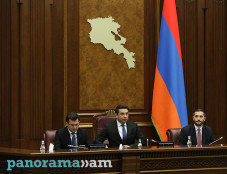
Members of anti-Islamic State coalition may drop out over time - US Central Command
Countries collaborating with the United States in the fight against the Islamic State (IS) extremist group in the Middle East will back out of the coalition over time, US Central Command (CENTCOM) Commander Gen. Lloyd Austin predicts, according to RIA Novosti.
"It's not unreasonable to think that one or more countries may decide that they need to do something to focus on something else at some point in the future," Gen. Austin said Thursday at an Atlantic Council event in Washington, DC.
Speaking of the military efforts of the 30-plus nation coalition to defeat IS and restore Iraq's territorial sovereignty, Gen. Austin said, "I'm not sure it will take decades...I don't see decades, it will take years."
Whether or not the coalition stays together over the long-term "is going to depend on each country's self-interest," Gen. Austin continued, adding that the role of the United States is to "manage the various interests" among the allies.
"We [the United States] serve as a central point of leadership and I think through our efforts, I think we'll be able to hold the coalition together and move forward," the general said.
US President Barack Obama announced the formation of an international coalition to fight IS, also known as the Islamic State of Iraq and Greater Syria (ISIS), or the Islamic State of Iraq and the Levant (ISIL), in September. Washington said it was going to provide support, equipment and training to Kurdish and Iraqi forces and Syria's moderate opposition in order to respond to the IS threat.
IS extremists have been fighting the Syrian government since 2012. In June, 2014 the group started launching attacks in Iraq. In August, the Unites States approved limited airstrikes against IS targets in the country. The strikes were extended to Syria in September.
Newsfeed
Videos






























